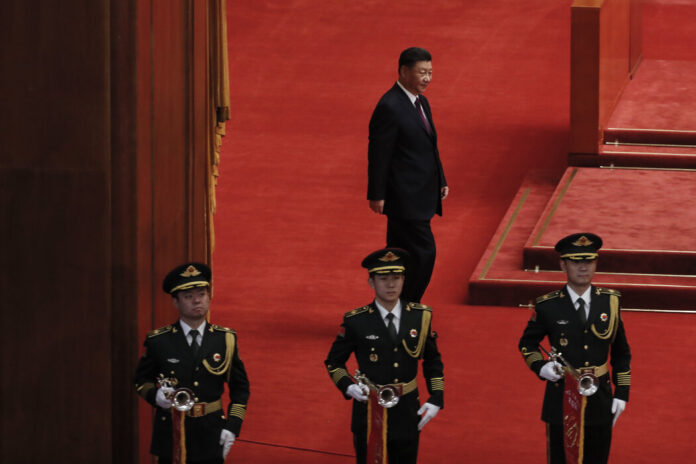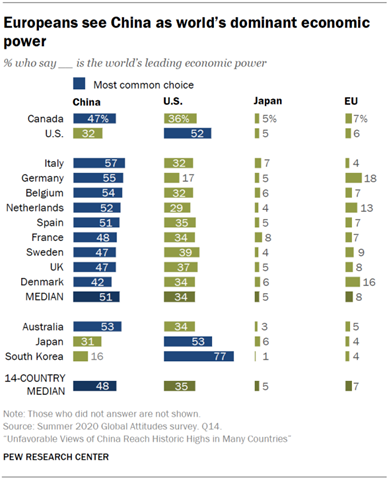
On 6th October, Pew Research Center, a nonpartisan fact tank seeking to promote a deeper understanding of issues at the intersection of religion and public affairs, published its latest research relating to the international views of China entitled “Unfavourable Views of China Reach Historic Highs in Many Countries.” The analysis is based on data from nationally representative surveys of 14,276 adults from June 10th to August 3rd this year, in 14 developed countries including the U.S., Canada, Belgium, Denmark, France, Germany, Italy, the Netherlands, Spain, Sweden, the UK, Australia, Japan , and South Korea.
The organization finds that a majority in each of the surveyed countries has a negative opinion of China. After comparing it with its previously similar studies, the institute points out that negative views of China increased most in Australia, where 81% don’t like the country, up 24% since 2019. In the U.S., the anti-China atmosphere has increased by almost 20% since President Donald Trump entered the White House, climbing 13% compared with last year.

The rise in unfavorable views comes firstly on how China has handled the Coronavirus pandemic. A median of 61% across the countries surveyed, accuse China has done a bad job dealing with the outbreak, which is more judgemental than how they think about the handling by their own country or WHO or EU. Though the Chinese government has taken the spread of virus under the control, many around the world questioned the hesitation to handle the outbreak at the beginning of this year, and others critiqued some strict measures applied by the Chinese government during the pandemic. China has basically back to the usual path while the remaining parts of the world still suffer from the pandemic, which is praised as a national effort for Chinese but many countries blamed China for opening a Pandora’s box by pulling others into this disaster and staying safe alone.
Perceptions of what China has done handling the Coronavirus pandemic color people’s overall insights of the country. Some views intense international relations like the Chinese economy benefits from others during the international Coronavirus pandemic going viral this year. The Chinese government wishes to change it by using social media platforms like twitter to defend Chinese national interests, but based on the research the effect is quite unsatisfied, and maybe even worse, especially after the Chinese foreign ministry has taken an increasingly strident tone against the accusations of the U.S., Australia, and other countries during the pandemic.
Such actions wouldn’t likely happened before President Xi, when China used “conservative, passive, and low-key diplomacy, current assertive, proactive, and high-profile approach is called “wolf-warrior diplomacy”. This change didn’t occur suddenly. Since 2010 when China’s GDP overtook Japan’s as the world’s second-largest, the Chinese have felt more confident about national power, and the Chinese government started to fight harder to protect the national interests, which is seen as a result of applying Deng Xiaoping’s ”韬光养晦(Tao Guang Yang Hui)” dictum for decades. The dictum has been translated as “temporary retirement to bide China’s time before going on the offensive”, “hide ability and pretend to be weak”, “conceal one’s true intention” and “hide ambitions and disguise its claws”, such widely used but inaccurate translations misled the international views, said Xiong Guangkai, a retired Chinese general.
The national image transmitted from President Xi, a strong, tough, and ambitious China, rises the national confidence and pride of Chinese but strengthens the fear of other countries’ people. Across the countries surveyed, a median of 78% doesn’t trust President Xi to make the right decisions about international affairs. The survey also asked about confidence in some other world leaders. The American President Trump gets the least confidence after President Xi, and German leader Merkel, French leader Macron, and the UK leader Johnson are at least twice as high as in Xi.

Considering China as a threat seems to be a census of many major economies, especially during this year when they are experiencing economic drops but China has overcome the pandemic and expects to achieve positive growth. Across the 14 countries surveyed, a median of 48% define China as the world’s leading economic power, and a median of 35% see the U.S. as the world’s top economy. However, in most European countries surveyed, at least half take China as the world’s top economy rather than the U.S., which is supported as the top one with around 30%.

The majority of countries in the world worry what China will do with continuously rising national power and unbeatable uniting efforts from the Chinese. Will China become the next dominant power? Will the Chinese government want to influence or even change other countries to satisfy its need as the U.S. government did? They seem to forget one important fact that China was the leading world power for thousands of years, and lost it within two centuries because old governments ceased to advance, especially in technology. All efforts China has made till now is catchup, to recover its strength and wealth. There is no problem a country and its people want to be better and stronger. Other countries need to question themselves before to doubt China: what they did to cease the pandemic? What they tried to develop economy? What their people sacrificed to advance the country?
(Source:Pew Research / BBC / The Diplomat / Translators Association of China)



